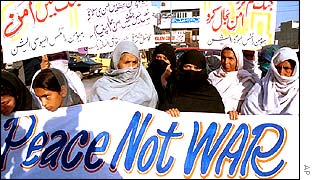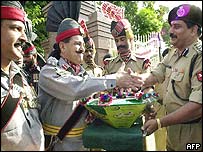Ashutosh Vardhana:
An impossible dream
|
A reflection on India and Pakistan Independence Day, 14 and 15 August
On 14 and 15 August 1947 Pakistan and India gained their independence from British colonial rule. Bloody conflicts and continued distrust between Hindu and Muslim communities followed. On the anniversary of this day, Ashutosh Vardhana, a Hindu writer living in England, proposes the creation of a common market for India, Pakistan, Afghanistan (etc) on the model of the European Community, which ended the centuries of war between Germany and France and brought prosperity and peace to Europe.
![]() An
impossible dream:
An
impossible dream:
What Pakistan and India can do with their independence
Bloody reality
It is necessary to dream the impossible to make it come true. For almost 100 years Indian independence was such a dream. But some great people not only dreamt it but patiently worked for it. That's why on 14 and 15 July 1947 (for Pakistan and India respectively) it turned into reality.
| Pakistani women protest against threatening nuclear war |
 |
Initially that reality was soiled by more hatred between Hindus and Muslims than they used to have for their British oppressors. Thousands murdered each other at the time of partition.
Religion and patriotism often lead to distrust, mutual contempt and violence. Muslims and Hindus will be happier if they do not act as if they were the sole bearers of universal truth.
My main worry should be how to become a better person in the eyes of god rather than why my neighbour has not yet adopted the 'true faith'. The same goes for my Muslim neighbour. Both of us will be happier as a result.
Religion is a private matter between god and man. Keeping it private will promote trust, peace and love between Hindus and Muslims. It is unhelpful if one community becomes more strident because the other is by nature more assertive. Insistence and assertiveness lead, as the events in Palestine show, only to a never ending cycle of violence.
How many Hindus have really close personal relationships with Muslims - and vice versa? We need more such relationships. Not all religious 'leaders' are saints, some are selfish criminals. These represent, in spite of their clamourings, neither their religion nor their community.
| Indian and Pakistani soldiers exchanging sweets at the border on Independence Day 2003 |
 |
I know that my Muslim friends are first and foremost human beings, and they know that I am a human being before I am a Hindu. The same things make us cry or rejoice. Therefore we can genuinely love each other, not only politely pretend to do so. It is unthinkable to me and my Muslim friends that we could ever raise a hand against each other. I will drive them to mosque and they will take me to my mandir if the car is broken down.
There is now a world-wide movement called 'random acts of kindness' (www.actsofkindness.org). Do not let a day pass without surprising a stranger by doing something nice to him: help him carry his bags, give him a lift, enquire about his children, lend him money, give him water, invite him into your house for a cup of tea, help him repair his house, his car or his computer, or at least, greet him with a smile in the street, even if he does not (yet) smile at you - and accept such gestures without hesitation!
Communal distrust and violence have soiled our life in independence. We must act wisely to remove them: not by more assertiveness but by more commonsense and generosity.
Look towards the future, not towards the past. It does not matter who tore down which temple two hundred years ago and built a mosque in its place. It mattered then, but it does not matter now. It will not happen in future: that matters. Restoration is not necessary. The temple or the mosque do not matter: peace does.
We know that God (by whatever name we call him) lives in the hearts of all creatures (Gita 10:20). He does not demand that we worship him in a particular spot. The best act of worship is not done in temple or mosque, but in the street and in our homes, by kindness towards all, especially by Hindus towards Muslims and vice versa. Such acts produce their own instant rewards by making us happy, even if the other person does not always respond kindly. In the long run, he will. Kindness is irresistible.
By doing our duty towards others (Hindus/Muslims) and supporting THE OTHER community before they have to insist on their rights, we worship God and allow him to live in our hearts.
An old shloka says:
A thousand Ramas born in Ayodhya will do /
No good if he's not born in you.
Rama was born right here in Rochdale. We do not have to go to Ayodhya to find him. He will find us, at home. By acts of kindness we can force him to come here. Allah lives in Rochdale. He will reveal himself right here if, by being kind to everybody, we give him half a chance.
Now to the dream which can come true if we want it. Consider the history of Germany and France, for centuries at war with each other, and how it led to the creation of the wealthy European Union.
Let us work for the same on the subcontinent, and the conflicts between India and Pakistan, and terrorism in Kashmir, Afghanistan and Sri Lanka will simply dissolve.
Create a common market of Afhganistan, Pakistan, India, Bangladesh, Sri Lanka, Nepal and Burma, devoting its energies not to religion or patriotism but whole-heartedly to the creation of wealth in the name of god. That will be a religious act.
American and European funds will flow into such a project, as did the Marshal Plan in the Europe of 1947 with such tremendous success. This is the most effective weapon against terrorism.
Do not tell me, as everybody does, that this is an impossible dream. If we want it, we can make it possible. Indians and Pakistanis are not more stupid than the Germans and the French.
Let us use our independence not to promote strife but to create a new union of independent states, pragmatic and devoted to prosperity. God and religion will take care of themselves. God will be grateful that he does not have to witness our squabbles and therefore will have time to give us his blessing.
© Ashutosh Vardhana
E-mail: ashutosh.vardhana@tudo.co.uk
(Note: Ashutosh Vardhana is a Hindu writer and lives in England.)
![]() Documentation
(Not for publication)
Documentation
(Not for publication)
Pakistan and India became independent at midnight
on 14 August 1947. Pakistan and India celebrate the event on 14 and 15
August respectively.
On 15 Aug 2003, Indian Prime Minister Vajpayee said India and Pakistan should fight poverty instead of each other.